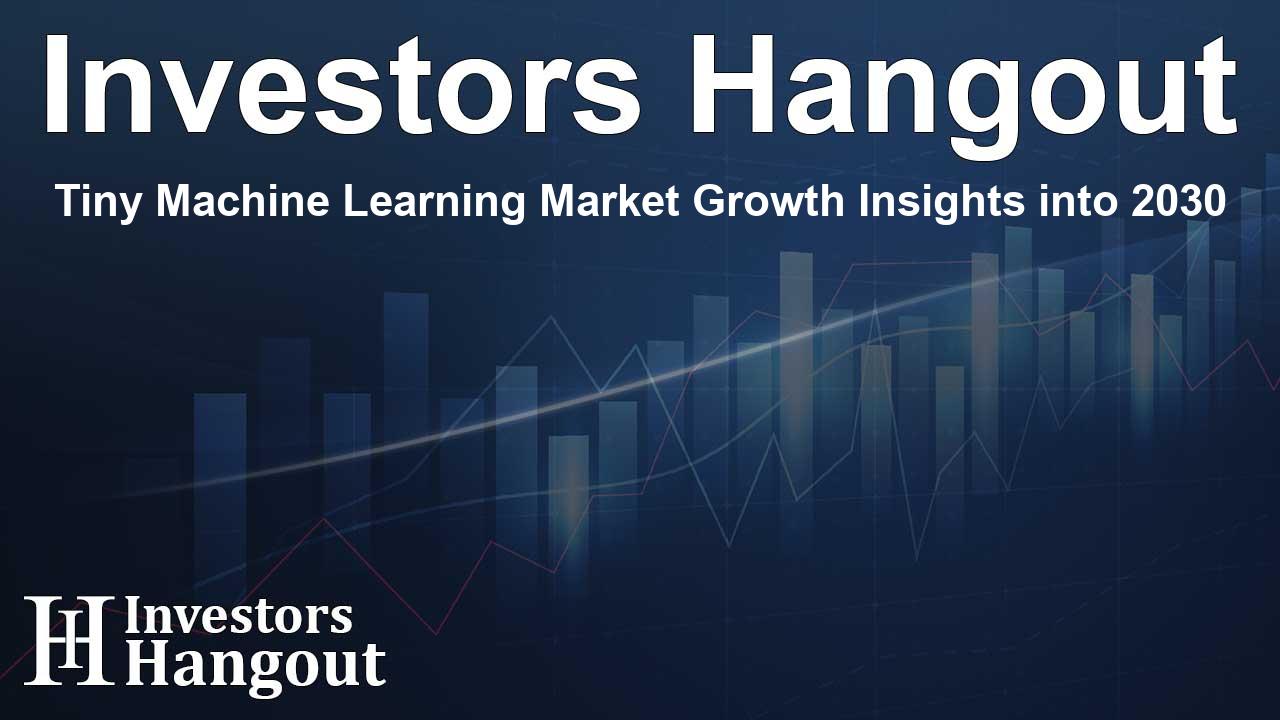Tiny Machine Learning Market Growth Insights into 2030

Understanding the Tiny Machine Learning Market
The Tiny Machine Learning (TinyML) market is set for remarkable growth, with estimates projecting it will reach USD 3.48 billion by 2030. As businesses and industries turn to more intelligent, efficient machine learning solutions that can operate directly on edge devices, the significance of this market is increasingly evident. The increasing demand stems from the ubiquity of IoT devices, wearable technology, and smart sensors, which are pivotal in facilitating real-time data processing and decision-making without cloud dependency.
Key Factors Fueling Market Expansion
Several driving forces contribute to TinyML's anticipated growth. Advancements in low-power hardware, the optimization of ML algorithms, and the development of robust software frameworks enhance both the capabilities and the performance of TinyML systems. As consumers and businesses alike search for sustainable and innovative ML applications, they will find numerous opportunities in the TinyML market, reflective of a shift towards a more efficient technological environment.
Efficiency and Performance
TinyML applications run on microcontrollers and embedded systems that often have constraints regarding processing power and memory. The use of programming languages like C allows developers to create lightweight ML algorithms that operate effectively under these limitations. C's widespread application in hardware programming ensures that TinyML models can seamlessly integrate with various sensors. Similarly, Java facilitates the development of sophisticated ML models compatible with diverse embedded devices, showcasing its comprehensive libraries and community support, further reinforcing the market's growth.
The Role of Healthcare in Market Development
The healthcare sector significantly propels the TinyML market, utilizing these technologies to improve patient care and increase operational efficiency. TinyML enables the creation of portable, wearable medical devices that monitor vital signs in real-time, facilitating continuous health assessments without cumbersome equipment. With predictive analytics and remote patient monitoring capabilities, TinyML applications offer substantial benefits, including early disease detection and personalized treatment plans.
Energy Efficiency and Sustainability
TinyML algorithms prioritize performing complex computations with minimal power consumption, thus enhancing battery life for IoT devices and wearables. This energy efficiency is crucial for applications that operate in remote sensing, environmental monitoring, and other scenarios where recharging may be impractical. The push for sustainable technology aligns with the broader trends in the global market, fostering the adoption of TinyML across various sectors.
Cost-Effectiveness as a Market Driver
Cost efficiency is yet another key driver for the TinyML market. By facilitating on-device data analysis, TinyML minimizes the dependence on expensive cloud-based processing, reducing operational costs significantly. This is particularly important for applications that are deployed in areas with limited internet connectivity. Furthermore, TinyML devices’ compact and integrated design lowers material and manufacturing costs, making them accessible to a wider audience.
Scalability and Flexibility in Deployment
Another essential aspect of TinyML is its scalability. TinyML frameworks support the deployment of ML models that can be tailored to specific requirements, whether for use in smart homes, industrial automation, or consumer electronics. The modular nature of these systems allows for easy integration and upgrades, accommodating the evolving needs of users.
Market Share Overview
In terms of market share, North America leads, bolstered by its advanced technology landscape and significant investment in AI and IoT. Europe follows closely, with considerable growth attributed to industrial automation and favorable government regulations promoting AI and ML integration. The Asia-Pacific region is rapidly expanding, driven by the electronics industry and growing investment in IoT in countries like China and Japan.
Frequently Asked Questions
What is Tiny Machine Learning (TinyML)?
Tiny Machine Learning (TinyML) refers to machine learning algorithms and technologies that can execute on small-sized, low-power devices, facilitating efficient real-time processing.
What are the primary applications of TinyML?
TinyML finds applications in various industries such as healthcare (wearable devices), agriculture (soil monitoring), manufacturing (predictive maintenance), and smart retail solutions.
How does TinyML enhance healthcare technology?
TinyML improves healthcare technology by enabling the development of portable devices that can monitor health metrics in real-time, facilitating timely medical responses and efficient patient monitoring.
Why is cost-effectiveness important in the TinyML market?
Cost-effectiveness is crucial as it allows organizations to adopt ML solutions without incurring excessive cloud processing fees and helps reach underserved markets with limited infrastructure.
What future trends can we expect for TinyML?
The future of TinyML includes greater energy efficiency, enhanced integration with IoT devices, and a broader application scope across industries, paving the way for innovative developments.
About The Author
Contact Thomas Cooper privately here. Or send an email with ATTN: Thomas Cooper as the subject to contact@investorshangout.com.
About Investors Hangout
Investors Hangout is a leading online stock forum for financial discussion and learning, offering a wide range of free tools and resources. It draws in traders of all levels, who exchange market knowledge, investigate trading tactics, and keep an eye on industry developments in real time. Featuring financial articles, stock message boards, quotes, charts, company profiles, and live news updates. Through cooperative learning and a wealth of informational resources, it helps users from novices creating their first portfolios to experts honing their techniques. Join Investors Hangout today: https://investorshangout.com/
The content of this article is based on factual, publicly available information and does not represent legal, financial, or investment advice. Investors Hangout does not offer financial advice, and the author is not a licensed financial advisor. Consult a qualified advisor before making any financial or investment decisions based on this article. This article should not be considered advice to purchase, sell, or hold any securities or other investments. If any of the material provided here is inaccurate, please contact us for corrections.
